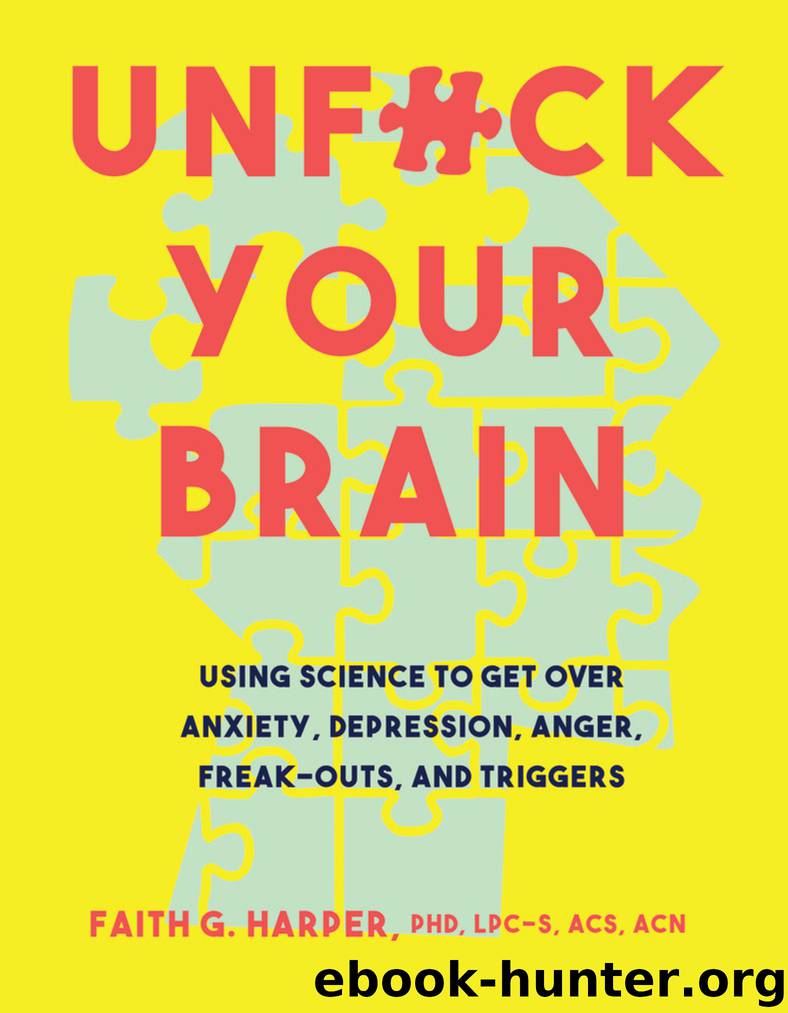Unfuck Your Brain: Using Science to Get Over Anxiety, Depression, Anger, Freak-Outs, and Triggers by Faith G Harper

Author:Faith G Harper
Language: eng
Format: epub
Publisher: Microcosm Publishing
Published: 2017-10-16T04:00:00+00:00
Peer Supports
There is a huge body of research that shows that peer-to-peer support partners (as the federal agency SAMHSA refers to them) are an enormous part of many people’s wellness and recovery processes. This makes sense. Someone who has similar lived experience has a level of empathy, understanding, and compassion that other people don’t. There are phenomenally caring treatment providers out there, but we often connect to the people who have also traveled the same path we are on.
There are lots of names for this role in communities, including recovery coach, sponsor, family partner, and systems navigator, to name a few. There are also clinical professionals with lived experience who may share that experience as part of the work they do with people.
If peer supports are available wherever you are seeking treatment, give it a try. Someone who has been in the same hole you are in is sometimes the best person to talk to about finding the way out, doncha know?
Natural Supports
These are the people who love you just because you belong to them. Your family, your friends, teachers, coworkers, etc. that go above and beyond their role in your life to support you getting better. Having people who love us just because they DO is so, so, so important to getting better. Use them! If they ask to help, let them! It takes far more strength to accept help than to reject it. Be strong enough to allow others into your life.
Choosing The Right Provider
This chapter is about a wide range of treatment options, not just your decision to choose the red pill or the blue pill. Along with all these options, it’s also important to choose the right provider.
There is no magic way to do this, other than asking others for recommendations and feedback from people you know, asking the provider questions about their practice, and finding someone else if the fit isn’t good.
Check out a potential provider’s web presence as much as possible. Do you get a feel for them and their style? Feel comfortable with the idea of seeing them? Do they share a worldview on healing that matches your own?
Create a list of what is important to you in a treatment provider and your goals for treatment. If the work you are doing doesn’t match those lists? Time to move on.
The important thing to remember about treatment is that it is not rent-a-friend. Treatment works when it is designed to help you process, heal, and move forward. If your time with this person becomes a time to perseverate and regurgitate rather than gain insight and release, it is doing more harm than good. Finding providers you like working with because they support you and guide you toward healing is vitally important. A good provider will not have their feelings hurt if you feel you will do better work with someone else. In fact, they should offer referrals and suggestions of who else you could connect with. The point of therapy is the getting better…not working with a particular person.
Download
This site does not store any files on its server. We only index and link to content provided by other sites. Please contact the content providers to delete copyright contents if any and email us, we'll remove relevant links or contents immediately.
Should I Stay or Should I Go? by Ramani Durvasula(6779)
Why We Sleep: Unlocking the Power of Sleep and Dreams by Matthew Walker(5637)
Fear by Osho(4083)
Flow by Mihaly Csikszentmihalyi(4047)
Rising Strong by Brene Brown(3777)
Why We Sleep by Matthew Walker(3767)
Too Much and Not the Mood by Durga Chew-Bose(3689)
How to Change Your Mind by Michael Pollan(3668)
The Hacking of the American Mind by Robert H. Lustig(3575)
Lost Connections by Johann Hari(3451)
He's Just Not That Into You by Greg Behrendt & Liz Tuccillo(3298)
Evolve Your Brain by Joe Dispenza(3045)
What If This Were Enough? by Heather Havrilesky(2943)
Resisting Happiness by Matthew Kelly(2882)
Crazy Is My Superpower by A.J. Mendez Brooks(2856)
The Courage to Be Disliked by Ichiro Kishimi & Fumitake Koga(2792)
The Book of Human Emotions by Tiffany Watt Smith(2767)
Descartes' Error by Antonio Damasio(2728)
In Cold Blood by Truman Capote(2680)
